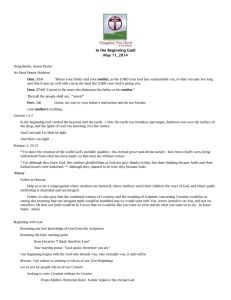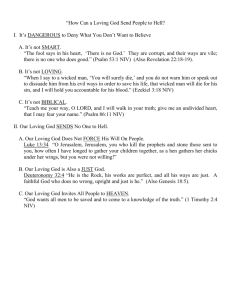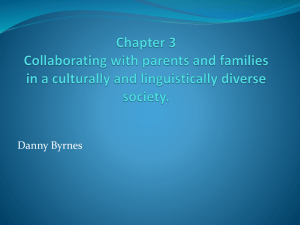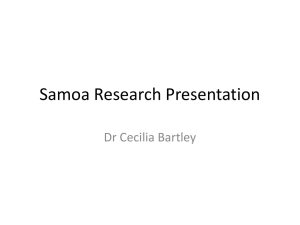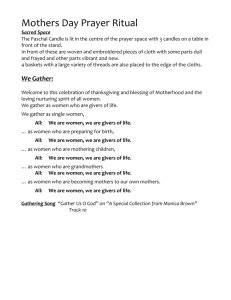Fifth Sunday of Easter, Mothers Day, May 10, 2015 Today, as I am
advertisement
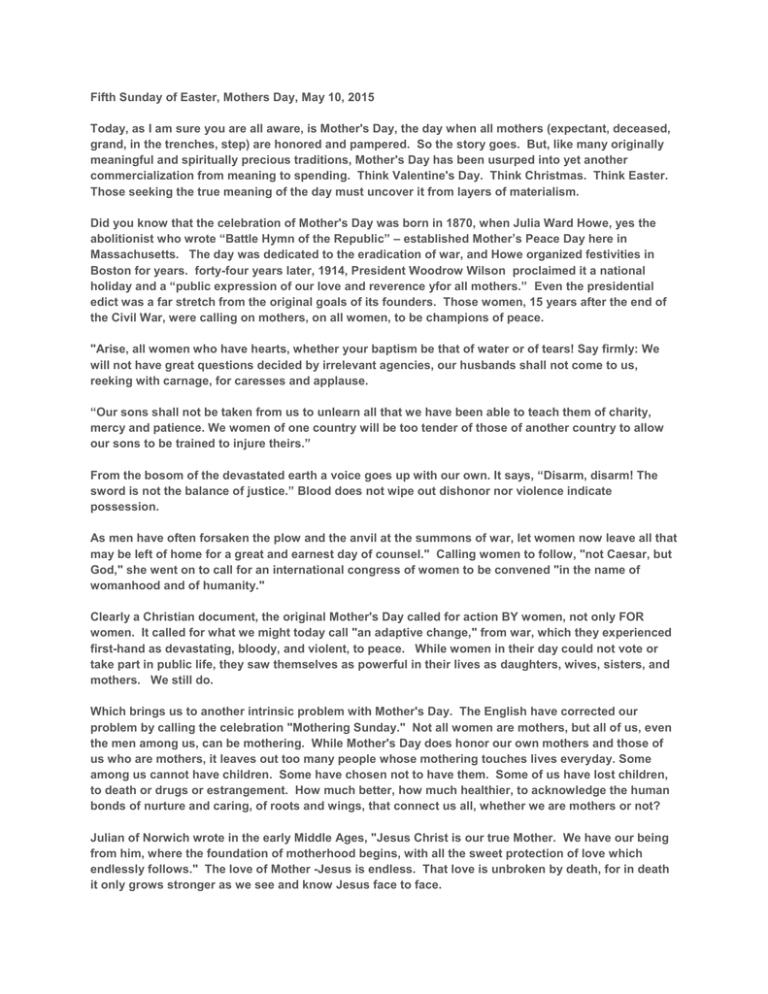
Fifth Sunday of Easter, Mothers Day, May 10, 2015 Today, as I am sure you are all aware, is Mother's Day, the day when all mothers (expectant, deceased, grand, in the trenches, step) are honored and pampered. So the story goes. But, like many originally meaningful and spiritually precious traditions, Mother's Day has been usurped into yet another commercialization from meaning to spending. Think Valentine's Day. Think Christmas. Think Easter. Those seeking the true meaning of the day must uncover it from layers of materialism. Did you know that the celebration of Mother's Day was born in 1870, when Julia Ward Howe, yes the abolitionist who wrote “Battle Hymn of the Republic” – established Mother’s Peace Day here in Massachusetts. The day was dedicated to the eradication of war, and Howe organized festivities in Boston for years. forty-four years later, 1914, President Woodrow Wilson proclaimed it a national holiday and a “public expression of our love and reverence yfor all mothers.” Even the presidential edict was a far stretch from the original goals of its founders. Those women, 15 years after the end of the Civil War, were calling on mothers, on all women, to be champions of peace. "Arise, all women who have hearts, whether your baptism be that of water or of tears! Say firmly: We will not have great questions decided by irrelevant agencies, our husbands shall not come to us, reeking with carnage, for caresses and applause. “Our sons shall not be taken from us to unlearn all that we have been able to teach them of charity, mercy and patience. We women of one country will be too tender of those of another country to allow our sons to be trained to injure theirs.” From the bosom of the devastated earth a voice goes up with our own. It says, “Disarm, disarm! The sword is not the balance of justice.” Blood does not wipe out dishonor nor violence indicate possession. As men have often forsaken the plow and the anvil at the summons of war, let women now leave all that may be left of home for a great and earnest day of counsel." Calling women to follow, "not Caesar, but God," she went on to call for an international congress of women to be convened "in the name of womanhood and of humanity." Clearly a Christian document, the original Mother's Day called for action BY women, not only FOR women. It called for what we might today call "an adaptive change," from war, which they experienced first-hand as devastating, bloody, and violent, to peace. While women in their day could not vote or take part in public life, they saw themselves as powerful in their lives as daughters, wives, sisters, and mothers. We still do. Which brings us to another intrinsic problem with Mother's Day. The English have corrected our problem by calling the celebration "Mothering Sunday." Not all women are mothers, but all of us, even the men among us, can be mothering. While Mother's Day does honor our own mothers and those of us who are mothers, it leaves out too many people whose mothering touches lives everyday. Some among us cannot have children. Some have chosen not to have them. Some of us have lost children, to death or drugs or estrangement. How much better, how much healthier, to acknowledge the human bonds of nurture and caring, of roots and wings, that connect us all, whether we are mothers or not? Julian of Norwich wrote in the early Middle Ages, "Jesus Christ is our true Mother. We have our being from him, where the foundation of motherhood begins, with all the sweet protection of love which endlessly follows." The love of Mother -Jesus is endless. That love is unbroken by death, for in death it only grows stronger as we see and know Jesus face to face. Today's lessons speak to us about life and about new life, about the outpouring of the Holy Spirit and the new song God places on our lips and in our hearts. We read of God's steadfast love and faithfulness to people everywhere. God's love is so alive that it even the natural world, "seas, rivers, and hills roar and clap and ring out with joy." It is like God is throwing a great and grand family picnicwhere everyone and everything is invited. The purpose of this family gathering is, John tells us, so that God can share the love that is in God and that love may come to dwell in us. On the love comes, From generation to generation, mothers to sons, fathers to daughters, friends to friends, me to you. The key word is abide. It means to remain, endure, be steadfast, wait, stay, continue…all words we are used to applying, especially on this day, to the all-encompassing mother-love. Jesus does not qualify or diminish it as such. By abiding in the love of Jesu, by staying true and by growing in the love of Jesus, we begin to perfect our wills and our skills to love, in the most powerful of ways: loving the disabled child, loving the precocious and the shy one, loving the athlete, the soldier, the daredevil, loving the bold and the tentative, loving the beauty queen and the awkward and self-effacing, loving the abused, the addicted, the lost, loving the lost who has been found, loving the aging, the dying and yes, loving ourselves and loving life. Yes, Jesus's message to us today is what he called his greatest commandment: love one another as I have loved you. Whether you are a mother or not, whether you are a woman or a man, whether you are Lutheran or Episcopalian or Catholic or Mennonite, whether you are 8 or 80, Jesus wants to live in each of us: to mother us and to friend us. Every hour of every day, world without end. amen.

